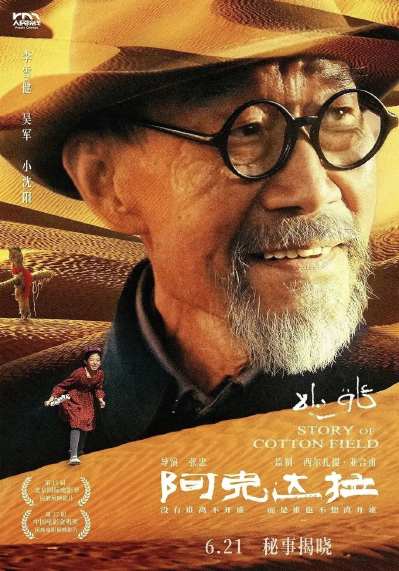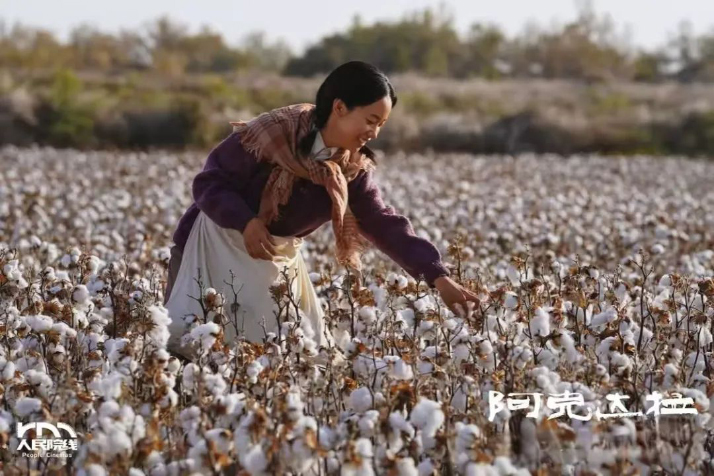| Xinjiang Today |
| The Catcher in the Cotton | |
| A film portraying the efforts of generations of workers to turn Xinjiang's barren land into cotton fields | |
|
|
 A poster of Story of Cotton Field
In 1950, a young woman from Shanghai named Hao Chunli arrived in Akdala, a remote township on the edge of Ili Kazak Autonomous Prefecture. She came as part of the early wave of educated youth sent to Xinjiang in the 1950s and 1960s to accelerate its development. Akdala was a demanding place: the land swept by sand and wind, the climate unforgiving. Yet Hao threw herself into the great task of reclaiming barren land and planting cotton. It was here, amid the isolation of this borderland, that Hao met Li Huaihe. Li was also among the large numbers of young intellectuals from across the country who answered the call of the nation to support Xinjiang. The two enjoyed each other's companionship, then love. Opportunities to return to the east came more than once, but Hao refused them. She chose to stay. Their story, however, was cut short. On the very day they were to be married, while trying to rescue a young Uygur girl caught in a landslide, Hao was buried alive. Li never knew. Believing she had simply left him and returned east, he carried the wound in silence. For decades he remained in Akdala, carrying both his duty and his grief for decades. It was more than 60 years later, during a soil improvement project in Akdala, that workers unearthed a red scarf and a comb—belongings once carried by Hao. Only then did Li realize she had never left. She had been there all along, resting in the land they had both sought to cultivate.  Hao Chunli picks cotton in the fields in the film Story of Cotton Field (SCREENSHOT)
The white plain Hao and Li are characters of a film. This land—Akdala—is the Chinese name of the film, whose English title is Story of Cotton Field. In the local language, Akdala means white plain, with white symbolizing cotton. The film was released nationwide on June 21. It tells the story of several generations of workers coming to Xinjiang from other parts of China, who, over the course of seven decades, devoted themselves to cultivating cotton—striving to transform desert into fertile fields. "From the first generation of these workers who rooted themselves in Xinjiang to break new ground to young people in the new era carrying the torch to drive rural revitalization, the film traces this journey through three intertwined narratives—individual destiny, family transformation and national strategy," director Zhang Zhong said at the film's premiere in Beijing. "It shows how assistance to Xinjiang has evolved from 'giving blood' to 'generating blood'—from reliance on outside support to building self-sustaining strength," Zhang said. From family to nation Beginning from the older generation who arrived in Xinjiang seven decades ago, the film continues to tell the story of a new generation of young people. Among them was Tian Li, a disciple of Li, who had inherited not only his mentor's lifelong cotton knowledge but also his sense of duty. Tian completed his three-year assignment in Xinjiang and was preparing to return to his home in Fujian Province, eager to reunite with his wife and daughter. Yet just as he reached the airport, word came that Akdala was facing a cotton crisis. He chose to stay. That was in the year 2020, when the United States, citing false claims of forced labor involving Uygurs, banned the import of cotton and cotton products from Xinjiang. To help farmers weather the storm, Tian began rallying support. He proposed diverting the cotton for export to domestic market while also advancing cotton processing for more added value. It was a long and difficult struggle, filled with setbacks and resistance. Yet Tian persisted. At last, his persistence broke through. Domestic sales channels opened, and orders poured in, breathing new life into Akdala's cotton fields. A lifetime devotion "Akdala is more than just a movie—it is a tribute to the spirit of those who assist with the development of Xinjiang," Zhang said, sharing the inspiration behind the film. "Countless people have devoted themselves to the region, and their stories deeply moved me. I made multiple trips to Xinjiang to capture their lives firsthand, striving to portray their collective reality as authentically as possible." Executive producer Xierzhati Yahefu emphasized that the film showcases not only Xinjiang's breathtaking landscapes and rich ethnic culture but also sacrifice and solidarity. The film is adapted from a novel by Wu Yuhui, a worker from Fujian Province, which chronicles the lives and dedication of the workers coming to assist Xinjiang from other parts of the country. Wu describes their enduring commitment as "lifelong support." He explained, "Among us assistance workers, we often say: one journey to Xinjiang, a lifetime of devotion. Even after our official term ends and we return to our original posts, our hearts remain tied to that land, and we continue to support its development in multiple ways." XT Comments to zhangshsh@cicgamericas.com |
|
||||||||||||||||||||||||||||||
|